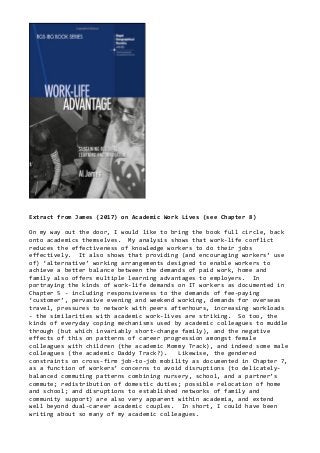
academic work lives: stress, overwork, work-life conflict
- 1. Extract from James (2017) on Academic Work Lives (see Chapter 8) On my way out the door, I would like to bring the book full circle, back onto academics themselves. My analysis shows that work-life conflict reduces the effectiveness of knowledge workers to do their jobs effectively. It also shows that providing (and encouraging workers’ use of) ‘alternative’ working arrangements designed to enable workers to achieve a better balance between the demands of paid work, home and family also offers multiple learning advantages to employers. In portraying the kinds of work-life demands on IT workers as documented in Chapter 5 - including responsiveness to the demands of fee-paying ‘customer’, pervasive evening and weekend working, demands for overseas travel, pressures to network with peers afterhours, increasing workloads - the similarities with academic work-lives are striking. So too, the kinds of everyday coping mechanisms used by academic colleagues to muddle through (but which invariably short-change family), and the negative effects of this on patterns of career progression amongst female colleagues with children (the academic Mommy Track), and indeed some male colleagues (the academic Daddy Track?). Likewise, the gendered constraints on cross-firm job-to-job mobility as documented in Chapter 7, as a function of workers’ concerns to avoid disruptions (to delicately- balanced commuting patterns combining nursery, school, and a partner’s commute; redistribution of domestic duties; possible relocation of home and school; and disruptions to established networks of family and community support) are also very apparent within academia, and extend well beyond dual-career academic couples. In short, I could have been writing about so many of my academic colleagues.
- 2. These patterns of work-life conflict amongst academics emerge from the demands of juggling multiple core activities of research, teaching, administration, student mentoring with extra-curricular responsibilities and commitments around personal life and family. These work-life conflicts form the focus of a recent book by US-based academics Maggie Berg and Barbara Seeber (2016) The Slow Professor: Challenging the Culture of Speed in the Academy, which calls for a slow-down in the pace of academic life through collective reform (rather than piecemeal individual fixes), and to ‘take back the university’. Here in the UK, the combined pressures of the Research Excellence Framework, National Student Survey, Research Impact Agenda, Teaching Excellence Framework and VC concerns to rise up through multiple university ranking tables are manifest through increased instances of work-related stress amongst academics, and motivate a major campaign by the UK’s University and College Union (UCU) to improve work-life balance in UK academia. Likewise, the growth of the UK’s Athena SWAN Charter initiative, concerned to promote the career advancement of women in STEMM subjects (and recently expanded to include humanities and social science) is also revealing in relation to the lived realities of work-life conflict amongst female academics. Through my involvement in four separate Athena SWAN bids to date, our cross-faculty consultations have documented multiple instances of female colleagues on reduced hours contracts but who maintain full hours workloads; a widespread inability and/or unwillingness to use their full holiday entitlement because the pressure to publish precludes this; and recent returners from maternity leave who, despite clear provision in REF for a pro rata reduction in the required portfolio of 4 papers, are still asked to submit 4 so as not to lessen the size and quality of departmental submissions ‘unnecessarily’. Likewise, the absurdity of academic staff time use surveys which continue to cap the working week at 35 hours (less than half of the real figure for many colleagues). Also revealing are the kinds of responses by university employers. In Chapter 5, I identified IT workers’ concerns around ‘fruit-bowl-type’ employer responses that target the symptoms of work-life conflict rather than deal with their fundamental causes. Sadly, such responses are not limited to technology employers. In one London-based Russell Group university, the managerial response to a 2015 staff survey that identified significant problems of work-life conflict amongst academic staff was to provide opportunities for colleagues to purchase body massages. Similarly, colleagues at another London-based Russell Group university were encouraged to destress by taking up the opportunity to stroke a guide dog puppy. My suggestion then is that employer scepticism around the so-called ‘business case’ for work-life balance is far from restricted to technology employers. Rather, we too have a way to go in academia to recognise and endorse the multiple learning advantages that accrue to workers and employers alike through the provision and take-up of ‘alternative’ and ‘non-traditional’ working arrangements that better enable workers to reconcile competing demands and responsibilities of paid work, home and family. The key findings of this book around a more progressive WLB ‘dual agenda’ suggest that we may well benefit from a rethink. --